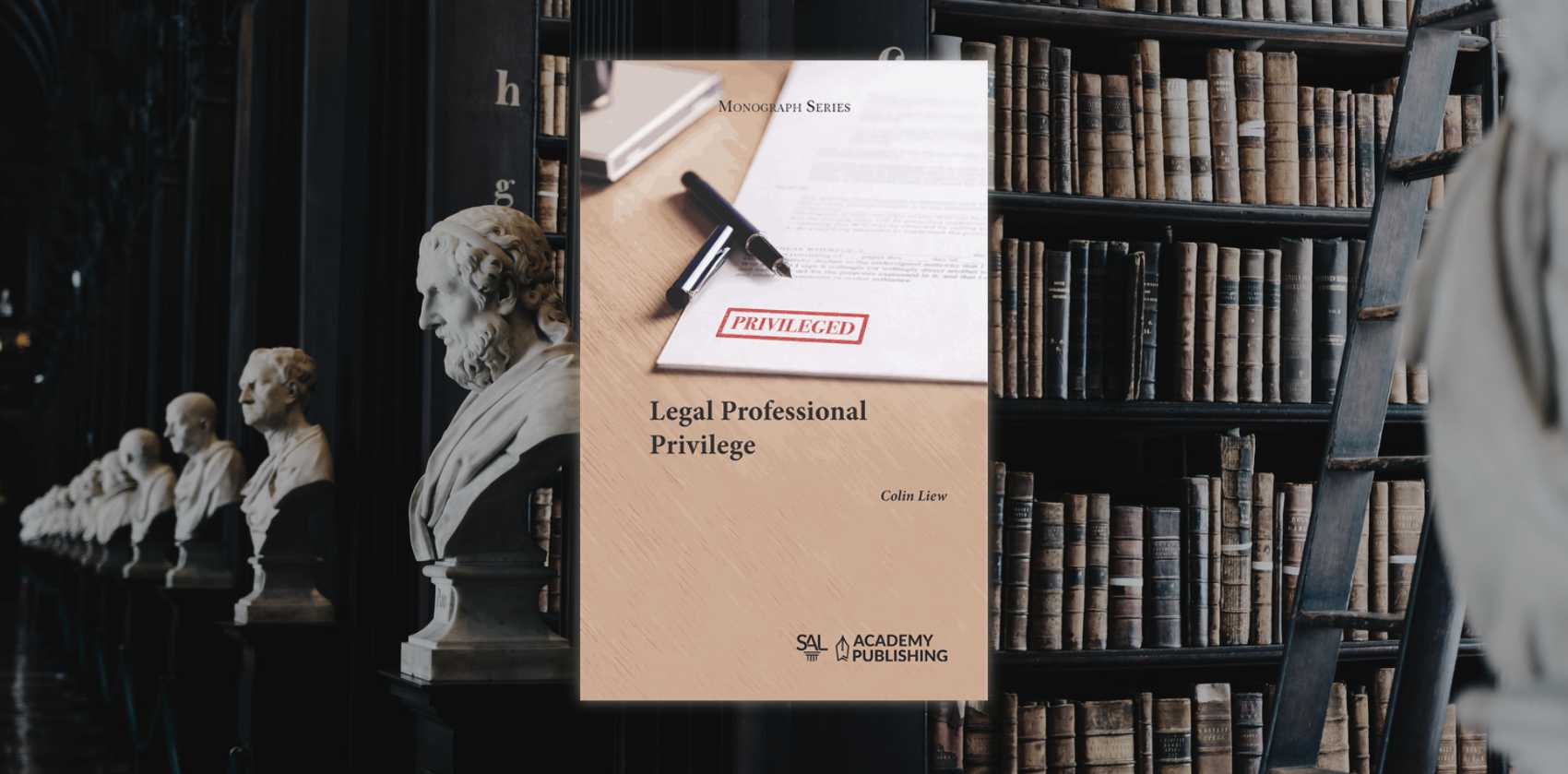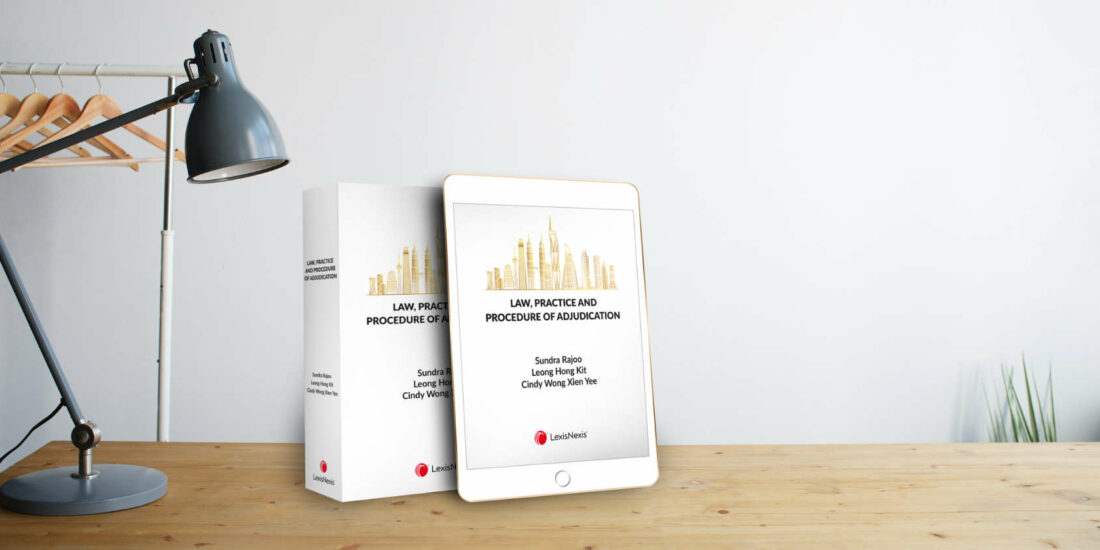Legal Professional Privilege
The learned author, Colin Liew, of Legal Professional Privilege (Singapore: Academy Publishing, 2020), threads the needle by putting together a comprehensive tome for practitioners needing guidance on the law of privilege from a dearth of local case authorities on the topic. He does so by doing three things: first, Mr Liew surveys local case authorities and organises them into accessible chapters, highlighting the gaps in Singapore jurisprudence on legal privilege; second, he weaves from case authorities in foreign jurisdictions persuasive to the Singapore Courts strong candidate principles to fill those gaps; and third, the author analyses the correctness of some oft-cited local case authorities, providing meaningful critique.
The first two endeavours are to be expected from a book of this nature from a reputable author and an established publisher with a seasoned editorial team. Local practitioners have, by now, come to expect and become reliant on comprehensive Court of Appeal judgments which do not merely limit the analysis on narrow issues in dispute but comprehensively set out the law on complex subjects. One need only look to the Court of Appeal’s trilogy that is Zurich Insurance (Singapore) Ltd v. B-Gold Interior Design & Construction Pte Ltd [2008] 3 SLR(R) 1029, Sembcorp Marine Ltd v PPL Holdings Pte Ltd [2013] 4 SLR 193 and Y.E.S. F&B Group Pte Ltd v Soup Restaurant Singapore Pte Ltd [2015] 5 SLR 1187 to answer most of the questions which arise in commercial disputes surrounding contractual interpretation.
There is, however, no equivalent for the law of privilege. The locus classicus on the subject, Skandinaviska Enskilda Banken AB (Publ), Singapore Branch v Asia Pacific Breweries (Singapore) Pte Ltd and other appeals [2007] 2 SLR(R) 367 (Skandinaviska), is more than a decade old. That decision of the Court of Appeal by the hand of the Honourable Judge of Appeal Andrew Phang, a law professor prior to His Honour’s elevation to the bench, is possibly the most helpful decision to practitioners on the law of privilege. Helpful as that decision may be in distilling and clarifying the applicable principles on the law of privilege, Skandinaviska does not purport to nor can it fully address all controversies on the subject. To take one example, the Court of Appeal in Skandinaviska commended the approach taken by the Full Court of the Federal Court of Australia in Pratt Holdings Pty Ltd v Commissioner of Taxation [2004] FCAFC 122 (Pratt) to recognise as being protected by legal advice privilege communications from a third-party to a client for the dominant purpose of obtaining legal advice. At the same time, the Court of Appeal was careful to hold back on giving a full endorsement because counsel did not present arguments on the issue (at least not fully). The issue was subsequently considered six years later by the learned Assistant Registrar Amy Tung in Boey Chun Hian (by his guardian and next friend, Boey Ghim Huat) v Singapore Sports Council (Neo Meng Yong, third party) [2013] SGHCR 15 (Boey) at [44] which applied in ratio decidendi the approach in Pratt to find that a report of a committee of inquiry convened to look into the near-drowning of a child at a public swimming complex was not protected by privilege as it had not been created for the dominant purpose of obtaining legal advice. It is not uncommon for practitioners to refer to Skandinaviska as support for the approach taken in Pratt whilst, unfortunately, omitting mention of Boey which is an unreported judgment. On this issue and many other pertinent issues, Mr Liew’s book presents all relevant local and foreign case authorities in a detailed and cogent fashion to aid the practitioner in their pleading so they can be complete in their submission. He does so not only in prose but also in the form of well-organised tables such as the three tables at pages 237 to 239 of the book which pithily capture the myriad communications that are protected by privilege.
That being said, it is the third endeavour which this writer has found to be the most impressive aspect of Mr Liew’s book. Mr Liew does not assume the correctness of the decisions he cites, including decisions of the Singapore Court of Appeal and High Court. He carefully explains the difficulties with the Courts’ reasoning so that the practitioner in relying on some of the case authorities does not assume sure footing only to find support giving way at a time when it is most needed, namely, under the weight of further and sustained argument from his or her opponent. After all, the Singapore Courts never shy away from departing from their previous decisions in the face of more detailed argument in subsequent cases. It is not enough to simply say that a proposition is correct because the Courts have said so.
For example, this writer has found the decision in Gelatissimo Ventures (S) Pte Ltd v Singapore Flyer Pte Ltd [2010] 1 SLR 833 (Gelatissimo) to be oft-cited as the last port of call in desperate applications to seek disclosure of what are clearly privileged documents. The High Court in Gelatissimo is entirely correct in recognising that privilege is not absolute and that there are exceptions to justify ordering disclosure. Its reasoning, however, presents difficulties insofar as it has cast the “fraud” exception in a manner which might suggest a somewhat low bar to invocation. This invites its (indiscriminate) use when one is met in a discovery application with a claim of privilege. Mr Liew’s legal archaeology in tracing the roots of the “fraud” exception is admirable. He observes that the language of a “prima facie case” of fraud which must be demonstrated to invoke the “fraud” exception should not be allowed to obscure the fact that the burden resting on the party seeking to invoke the exception is a heavy one. In this regard, Mr Liew observes that the High Court in Gelatissimo has erred in comparing that burden with what is required to be proven in an application for an interlocutory injunction. Mr Liew also points out that the High Court had suggested that the standard of proof might further depend on two considerations, namely, whether the communication is protected by one or two strands of privilege (legal advice privilege and/or litigation privilege) so that a lower standard of proof is required if only one strand is concerned and whether the alleged fraud is closer in nature to traditional criminal and civil fraud cases so that a lower standard of proof is required. This, Mr Liew, says is not supported by any authority and appears to have resulted from the Judge’s “questionable reliance on principles drawn from the grant of interlocutory injunctions”. It is respectfully suggested that Mr Liew’s analysis is entirely correct on these points and that Gelatissimo is wrong. This writer considers this third endeavour to be particularly important where the law of privilege in Singapore is still in a state of flux (as it is elsewhere). One needs to know the lay of the land, in particular, the pitfalls, so as to seek higher ground. Mr Liew’s book provides that guidance.
In conclusion, the practitioner will find sure and secure footing in Mr Liew’s analysis should he or she come to be mired in difficult issues concerning privilege. If, unexpectedly, any part of that analysis is rejected, and the practitioner comes under fire in Court, the practitioner will always be able to retreat with grace by pointing to compliance with the command in the last paragraph of the foreword where the Honourable Judge of Appeal Steven Chong had said, “It [i.e. the book] should be the first port of call for research whenever the issue of legal professional privilege arises.”







